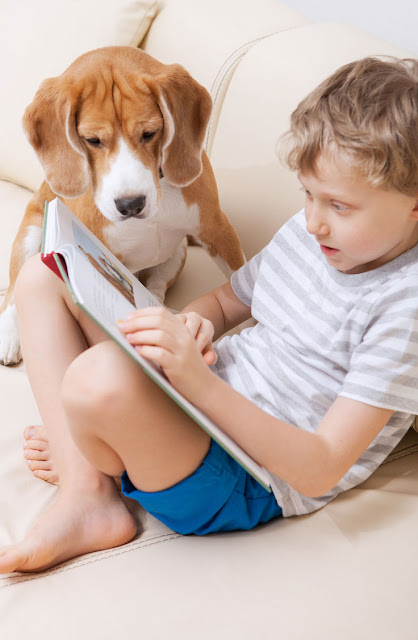Reading to Dogs May Improve Literacy
A new review of existing research finds
reading to dogs may help children’s literacy – but the quality of evidence is
weak.
As an Amazon Associate I earn from qualifying purchases. As an Etsy affiliate and Marks and Spencer affiliate, I earn from qualifying purchases.
 |
| Photo: waldru/Shutterstock |
By Zazie Todd, PhD
This page contains affiliate links which means I may earn a commission on qualifying purchases at no cost to you.
This page contains affiliate links which means I may earn a commission on qualifying purchases at no cost to you.
That’s the conclusion of a new paper by
Sophie Hall
et al (University of Lincoln). They searched the literature for studies that
investigate the effects of programs in which children read to dogs, and
conducted a systematic review of 48 papers.
They write, “The evidence suggests that
reading to a dog may have a beneficial effect on a number of behavioural
processes which contribute to a positive effect on the environment in which
reading is practiced, leading to improved reading performance.”
It sounds very promising: if children read
out loud to dogs, they have a captive and non-judgemental audience. Such
programs are becoming increasingly popular, so it’s important to know if they
really work – not least because, as very inexpensive programs, it could
be a cost-effective way to improve literacy.
Reading sessions, with volunteer dogs and handlers, take place in schools, libraries, and other locations.
Reading sessions, with volunteer dogs and handlers, take place in schools, libraries, and other locations.
“I only like to read if I am in a good
mood. I am usually in a good mood on Saturdays because I have a chance to read
to Lucky,” is what one 10-year-old told Intermountain Therapy Animals,
who have trained over 3000 canine teams since 1999.
The review highlights several ways in which
canine reading programs might help. Dogs can provide social support in
themselves and also increase support from other people (the social support
hypothesis). People’s affiliation with nature might lead to increased
engagement when reading to a dog (the biophilia hypothesis).
Other mechanisms may include reduced anxiety, increased confidence and more motivation.
Other mechanisms may include reduced anxiety, increased confidence and more motivation.
The scientists classified the research
according to established guidelines (called PRISMA). They were inclusive in
identifying papers to include, and much of it was not of good quality. Some of
the problems they identified were small sample sizes, lack of a control group, not
enough information about the children who took part (e.g. if they are normally
developing), failure to use standardized tests to assess reading ability, and
not saying how long the reading intervention lasted.
So what kind of research is needed? The
authors say there is a particular need for randomized controlled trials. These
are the ‘gold standard’ for knowing if an intervention works or not. They only
identified one for their review, which found accuracy and reading comprehension
were better in children who read to a dog rather than a teddy bear or adult, or
a control group that did not read to anyone.
The finding that reading to dogs appears to
be helpful, but we don’t know what might cause this, is another reason for more
research.
The researchers also highlight the need to
take account of individual differences between children (some of whom might not
like dogs, be allergic to them or frightened of them), and to find out which
young readers could benefit most from such programs.
The full paper is open access via the link
below, and includes a diagram outlining the different ways reading to dogs may
help children.
If you are interested in volunteering your
dog for a reading program, several organizations run them, including Reading Education Assistance Dogs (Intermountain Therapy Animals, international),
The Bark and Read Foundation (Kennel Club, UK), Classroom Canines
(Delta Society, Australia), and many others. Dogs should be friendly, up to
date with vaccinations, able to sit while patted by a stranger, and take treats
gently. Delta Society has a checklist to see if your dog might be a good
candidate.
If you liked this post, check out my book Wag: The Science of Making Your Dog Happy. Modern Dog magazine calls it "The must-have guide to improving your dog's life."
Zazie Todd, PhD, is the award-winning author of Wag: The Science of Making Your Dog Happy and Purr: The Science of Making Your Cat Happy. She is the creator of the popular blog, Companion Animal Psychology, writes The Pawsitive Post premium newsletter, and also has a column at Psychology Today. Todd lives in Maple Ridge, BC, with her husband, one dog, and two cats.
Useful links:
Reference
Hall, S., Gee, N., & Mills, D. (2016). Children Reading to Dogs: A Systematic Review of the Literature PLOS ONE, 11 (2) DOI: 10.1371/journal.pone.0149759
You
might also like:
Do children benefit from animals in the classroom?
Does animal-assisted therapy help at-risk boys?
De-stressing with a puppy for parents of children with autism
Do children benefit from animals in the classroom?
Does animal-assisted therapy help at-risk boys?
De-stressing with a puppy for parents of children with autism
As an Amazon Associate I earn from qualifying purchases. As an Etsy affiliate and Marks and Spencer affiliate, I earn from qualifying purchases.




